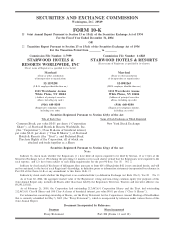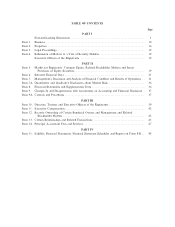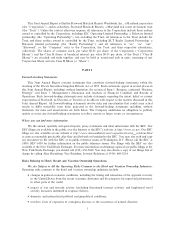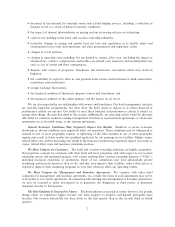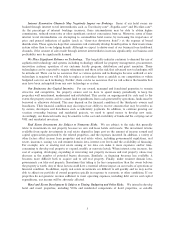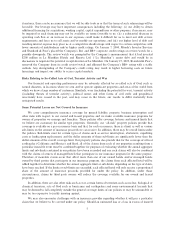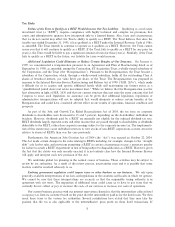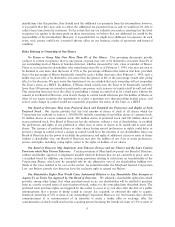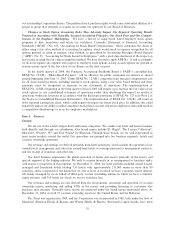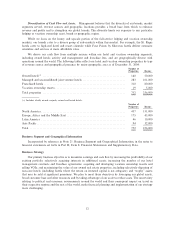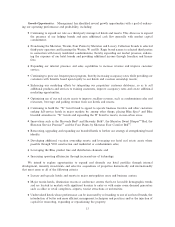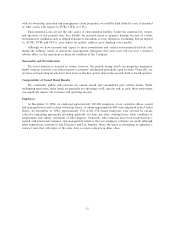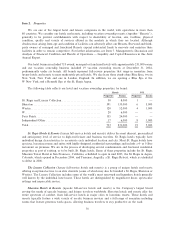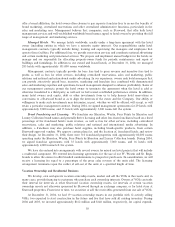Starwood 2004 Annual Report Download - page 16
Download and view the complete annual report
Please find page 16 of the 2004 Starwood annual report below. You can navigate through the pages in the report by either clicking on the pages listed below, or by using the keyword search tool below to find specific information within the annual report.Tax Risks
Failure of the Trust to Qualify as a REIT Would Increase Our Tax Liability. Qualifying as a real estate
investment trust (a ""REIT'') requires compliance with highly technical and complex tax provisions that
courts and administrative agencies have interpreted only to a limited degree. Also, facts and circumstances
that we do not control may aÅect the Trust's ability to qualify as a REIT. The Trust believes that since the
taxable year ended December 31, 1995, it has qualiÑed as a REIT under the Internal Revenue Code of 1986,
as amended. The Trust intends to continue to operate so it qualiÑes as a REIT. However, the Trust cannot
assure you that it will continue to qualify as a REIT. If the Trust fails to qualify as a REIT for any prior tax
year(s), the Trust would be liable to pay a signiÑcant amount of taxes for those year(s). Similarly, if the Trust
fails to qualify as a REIT in the future, our liability for taxes would increase.
Additional Legislation Could Eliminate or Reduce Certain BeneÑts of Our Structure. On January 6,
1999, we consummated a reorganization pursuant to an Agreement and Plan of Restructuring dated as of
September 16, 1998, as amended, among the Corporation, ST Acquisition Trust, a wholly owned subsidiary of
the Corporation, and the Trust (the ""Reorganization''). Pursuant to the Reorganization, the Trust became a
subsidiary of the Corporation, which, through a wholly-owned subsidiary, holds all the outstanding Class A
shares of beneÑcial interest, par value $0.01 per share, of the Trust. The Reorganization was proposed in
response to the Internal Revenue Service Restructuring and Reform Act of 1998 (""H.R. 2676''), which made
it diÇcult for us to acquire and operate additional hotels while still maintaining our former status as a
""grandfathered paired share real estate investment trust.'' While we believe that the Reorganization was the
best alternative in light of H.R. 2676 and that our current structure does not raise the same concerns that led
Congress to enact such legislation, no assurance can be given that additional legislation, regulations or
administrative interpretations will not be adopted that would eliminate or reduce certain beneÑts of the
Reorganization and could have a material adverse eÅect on our results of operations, Ñnancial condition and
prospects.
As part of the Jobs and Growth Tax Relief Reconciliation Act of 2003, the tax rates on corporate
dividends to shareholders were decreased to 15 and 5 percent, depending on the shareholders' individual tax
brackets. However, dividends paid by a REIT are generally not eligible for the reduced dividend tax rate.
REIT dividends largely represent rents and other income that are passed through to shareholders as dividends
deductible to the REIT, rather than corporate earnings subject to the corporate income tax. The implementa-
tion of this statute may cause individual investors to view stocks of non-REIT corporations as more attractive
relative to shares of REITs than was the case previously.
Furthermore, the American Jobs Creation Act of 2004 (the ""Act'') was enacted on October 22, 2004.
The Act made certain changes to the rules relating to REITs including, for example, changes to the ""straight
debt'' safe harbor rules and provisions permitting a REIT in certain circumstances to pay a monetary penalty
for failure to satisfy a REIT requirement in lieu of being subject to disqualiÑcation as a REIT. However, given
the fact that the statute was only recently enacted, it is not entirely clear how the Internal Revenue Service
will apply and interpret each new provision of the Act.
We undertake global tax planning in the normal course of business. These activities may be subject to
review by tax authorities. As a result of the review process, uncertainties exist and it is possible that some
matters could be resolved adversely to us.
Evolving government regulation could impose taxes or other burdens on our business. We rely upon
generally available interpretations of tax laws and regulations in the countries and locales in which we operate.
We cannot be sure that these interpretations are accurate or that the responsible taxing authority is in
agreement with our views. The imposition of additional taxes could cause us to have to pay taxes that we
currently do not collect or pay or increase the costs of our services or increase our costs of operations.
Our current business practice with our internet reservation channels is that the intermediary collects hotel
occupancy tax from its customer based on the price that the intermediary paid us for the hotel room. We then
remit these taxes to the various tax authorities. Several jurisdictions have stated that they may take the
position that the tax is also applicable to the intermediaries' gross proÑt on these hotel transactions. If
8



